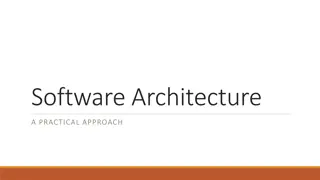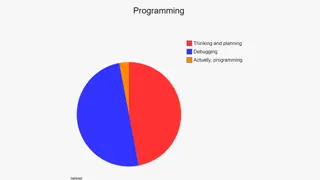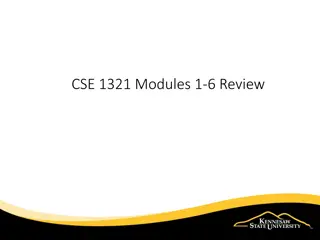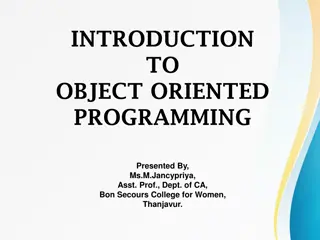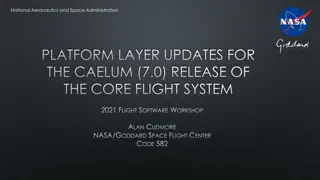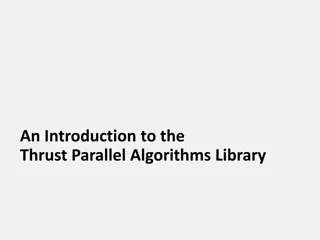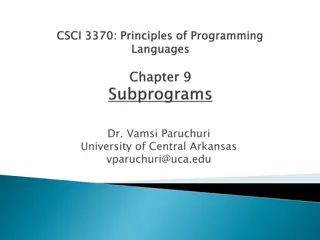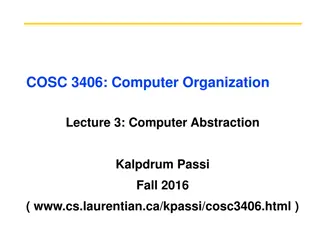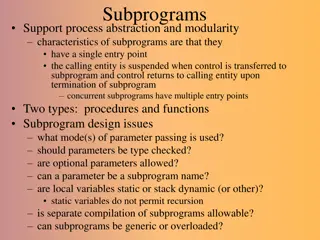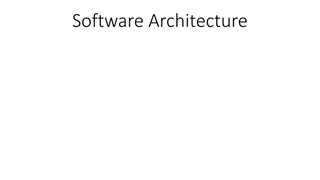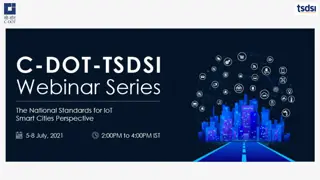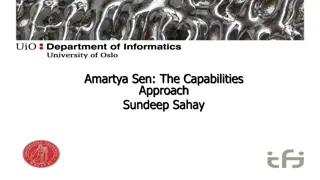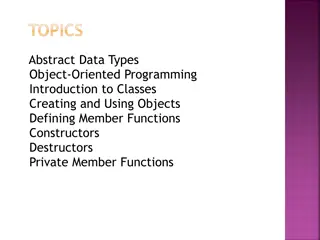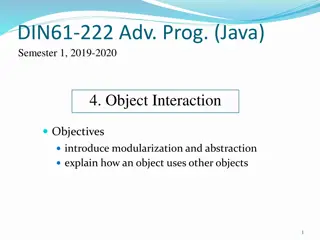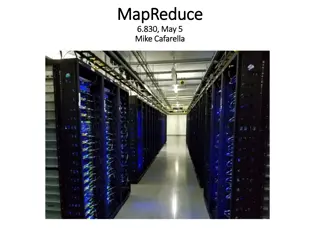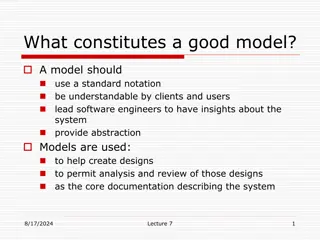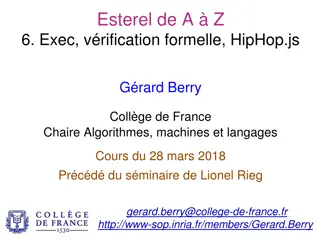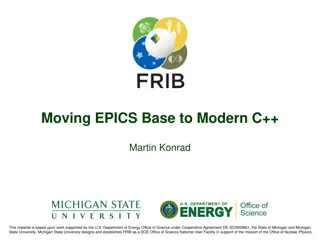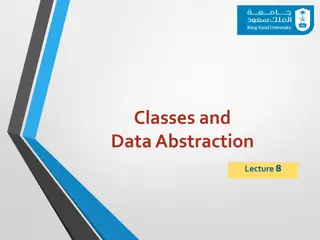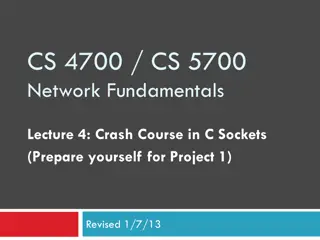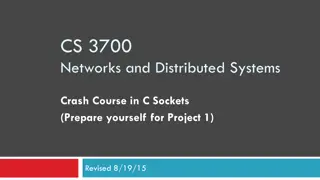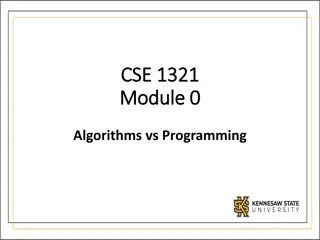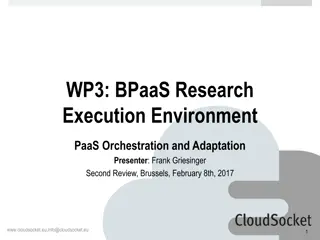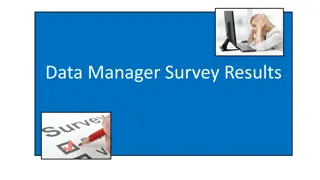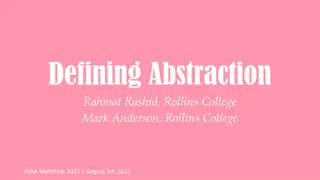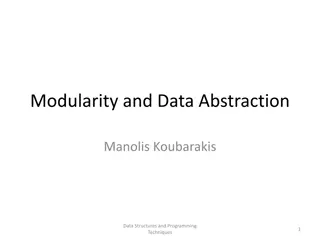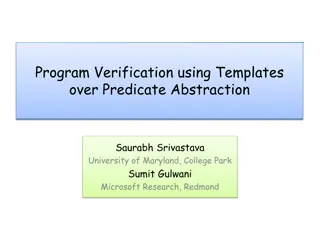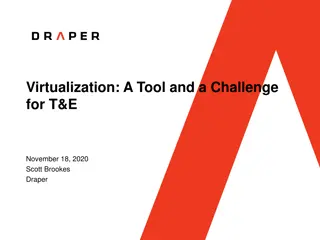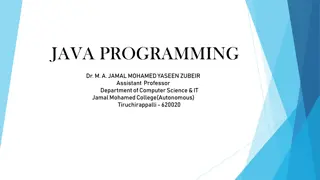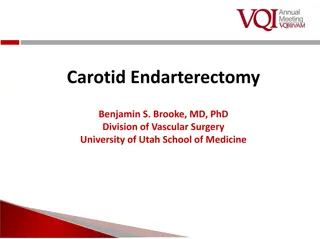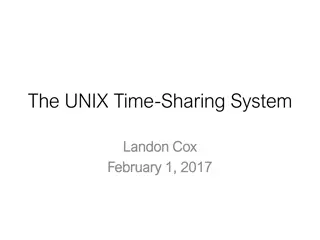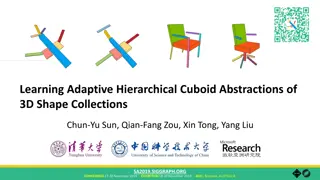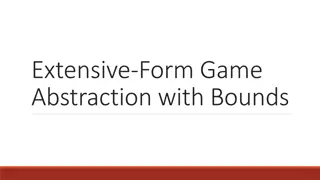Water Management Strategies for Efficiency and Sustainability in Supply Systems
Customers with metered water supply are more water-efficient, promoting metering can increase awareness. Options include meter optants, metering on change of occupancy, supply pipe renewal, water efficiency, consumption data audits, and commercial water efficiency. Distribution management focuses on
1 views • 6 slides
Understanding Algorithms and Programming Fundamentals
Learn about algorithms, programming, and abstraction in computing. Explore the definition and properties of algorithms, the relationship between algorithms and programming, and the concept of abstraction. Discover how algorithms are like recipes and how abstraction simplifies complex tasks in comput
1 views • 17 slides
Understanding the Importance of Software Architecture
Software architecture serves as a bridge between business goals and the final system, encompassing structures, elements, and behaviors. It involves set structures, such as modules and components-connectors, with a focus on behavior and abstraction for complexity management.
8 views • 15 slides
Network Function Abstraction A delicate question of (CPU) affinity?
Exploring the delicate balance of CPU affinity in network function abstraction, including challenges, benefits, and solutions like CPU pinning for network workloads. Learn about the impact on performance and scalability, as well as the importance of proper configuration in virtual and physical envir
3 views • 40 slides
Understanding Language Syntax Through Syntax Trees
Explore how both programming languages and spoken languages can be parsed into syntax trees, revealing the syntactic structure of sentences. Learn about terminals and non-terminals in syntax trees and how they represent different components of language. Dive into syntax tree abstraction for a deeper
3 views • 32 slides
Understanding Algorithms and Abstraction Concepts in Programming
Exploring algorithms as logical steps to accomplish tasks and abstraction as a way to group concepts for clarity in programming. Dive into flowcharts for sorting algorithms, pseudocode skeletons, and code snippets in various languages like C#, Java, and C++. Learn about handling variables and user i
2 views • 48 slides
Understanding Object Oriented Programming (OOP) Principles
Object-Oriented Programming (OOP) is a software design approach where programmers define data structures and operations. Key principles include objects, classes, data encapsulation, inheritance, polymorphism, and data abstraction. OOP allows for better organization and reusability of code, fostering
0 views • 15 slides
NASA Platform Layer Updates for the CAELUM (7.0) Release
The National Aeronautics and Space Administration (NASA) discusses platform layer updates for the CAELUM (7.0) release of the Core Flight System in the 2021 Flight Software Workshop. The platform layer consists of the Operating System Abstraction Layer (OSAL) and Platform Support Package (PSP), whic
1 views • 20 slides
Introduction to Thrust Parallel Algorithms Library
Thrust is a high-level parallel algorithms library, providing a performance-portable abstraction layer for programming with CUDA. It offers ease of use, distributed with the CUDA Toolkit, and features like host_vector, device_vector, algorithm selection, and memory management. With a large set of al
0 views • 18 slides
Understanding Subprograms in Programming
Delve into the fundamentals of subprograms, including design issues, local referencing environments, parameter-passing methods, and more. Explore the abstraction facilities, subprogram definitions, declarations, and the binding of actual parameters to formal parameters. Gain insights into the protoc
4 views • 36 slides
Understanding Computer Abstraction and Performance Metrics
Computer abstraction, instruction count, CPI, and performance metrics like clock cycles, CPU time, and program execution are crucial concepts in computer organization. Through examples and detailed explanations, this lecture explores how architecture, instruction sets, compilers, and algorithms impa
0 views • 27 slides
Overview of Subprograms in Software Development
Subprograms in software development provide a means for abstraction and modularity, with characteristics like single entry points, suspension of calling entities, and return of control upon termination. They encompass procedures and functions, raising design considerations such as parameter passing
4 views • 25 slides
Understanding Software Architecture Patterns
Software architecture refers to the high-level structures of a system, including architectural patterns that provide reusable solutions to common problems. Architectural patterns like Layered, Client-server, and Master-slave help in breaking down large systems for better management and maintenance.
5 views • 33 slides
National Standards for IoT in Smart Cities - Perspectives and Interworking
Explore the significance of national standards for IoT in smart cities through oneM2M use cases, interworking, testing, certifications, and 3GPP enhancements for MTC. Learn about simplifying service layers, device abstraction, and interworking in cellular IoT technologies. The session delves into th
0 views • 17 slides
Computational Thinking, Algorithms & Programming Overview
This unit covers key concepts in computational thinking, including decomposition, abstraction, and algorithmic thinking. Decomposition involves breaking down complex problems, abstraction focuses on identifying essential elements, and algorithmic thinking is about defining clear instructions to solv
1 views • 5 slides
The Capabilities Approach by Amartya Sen: Understanding Development and Freedoms
Amartya Sen's Capabilities Approach focuses on expanding people's real freedoms and choices to enhance development. It prompts debates on inequality measurement, role of institutions, and more. Sen identifies five types of freedoms essential for development, emphasizing the intrinsic and instrumenta
0 views • 28 slides
Introduction to Object-Oriented Programming and Data Abstraction
Introduction to object-oriented programming concepts including classes, objects, member functions, constructors, destructors, and abstract data types. Exploring the principles of abstraction in software development, passing objects to functions, and understanding the limitations of procedural progra
0 views • 47 slides
Understanding Modularization and Abstraction in Object-Oriented Programming
Modularization in programming involves breaking down complex problems into simpler sub-parts, while abstraction allows combining low-level details into higher levels. By using modules and abstract classes, software development becomes more manageable and efficient, especially in object-oriented prog
0 views • 39 slides
Understanding MapReduce for Large Data Processing
MapReduce is a system designed for distributed processing of large datasets, providing automatic parallelization, fault tolerance, and clean abstraction for programmers. It allows for easy writing of distributed programs with built-in reliability on large clusters. Despite its popularity in the late
0 views • 52 slides
Understanding UML for Effective Software Design
A good model should utilize standard notation, be easily understandable, and provide insights for software engineers. UML features, essentials of UML class diagrams, and details on classes, associations, and multiplicity are covered. The objective is to assist in software development through abstrac
3 views • 48 slides
Formal Verification and Automata Abstraction in Esterel
This content delves into the applications of formal verification and automata abstraction in Esterel, focusing on techniques such as verification by abstraction of automata, boolean verification using BDDs, bounded model checking in SAT/SMT, and more. The work of Gérard Berry at the Collège de Fra
0 views • 38 slides
Transitioning EPICS Base to Modern C++ for Enhanced Performance
Enhance your EPICS Base system by utilizing modern C++ features such as strict type checking, zero-cost abstraction, templates, and more. Learn the motivations behind switching to C++ and explore the new C++ features for improved efficiency and maintainability.
1 views • 16 slides
Impacts and Implications of Climate Change on Groundwater Resources
Climate change has significant effects on groundwater resources, impacting storage, abstraction, and regulation. These impacts lead to challenges in water supply management, with implications on socio-ecological activities such as water stress, drought, and disease outbreaks. Understanding these con
0 views • 44 slides
Understanding Classes and Data Abstraction in Object-Oriented Programming
Object-oriented programming (OOP) encapsulates data and functions into classes, akin to blueprints for creating objects. This lecture delves into the relationship between classes, objects, data members, member functions, and user-defined types. It emphasizes the reuse and encapsulation of code, info
5 views • 22 slides
Crash Course in C Sockets: Network Fundamentals
This lecture delves into the essentials of socket programming in C, covering the significance of C sockets in networking APIs. The session outlines the evolution of C sockets since 1983, emphasizing their role as the foundation of various socket APIs. It explains the client-server architecture, dist
0 views • 25 slides
Introduction to C Socket Programming for Networks and Distributed Systems
Crash course in C socket programming to prepare for Project 1. Learn about the history of C sockets, their importance in networking APIs, client-server architecture, key differences between clients and servers, common protocols, and the basics of socket abstraction in Unix. Familiarize yourself with
2 views • 25 slides
Understanding Algorithms and Programming: A Visual Introduction
Explore the fundamental concepts of algorithms and programming through visual representations and practical examples. Learn about algorithmic thinking, abstraction, recipe-like algorithms, and the importance of logical steps in accomplishing tasks. Discover how algorithms encapsulate data and instru
1 views • 17 slides
Orchestrating and Adapting Cloud Services for Dynamic Deployment
Research in BPaaS execution environment focuses on orchestrating and adapting cloud services across all layers to meet dynamic deployment needs. The motivating example illustrates response time and availability requirements during component failure. Current state highlights limitations in cloud prov
0 views • 18 slides
Satisfiability Modulo Abstraction for Separation Logic with Linked Lists
This study explores the application of satisfiability modulo abstraction in separation logic with linked lists. It presents a technique using abstract interpretation concepts to handle separation logic formulas beyond previous methods, specifically focusing on over-approximating heaps that satisfy t
0 views • 41 slides
Analysis of Data Manager Survey Results in VQI Abstraction
Survey results gathered from 942 notified Data Manager users in VQI abstraction revealed insights on responsibilities, experience levels, backgrounds, and facility types. Responses indicate varying levels of involvement with data collection, team size, and number of facilities managed, providing val
0 views • 27 slides
Exploring Abstraction in Mathematics: Insights from MAA MathFest 2022
Delve into the concept of abstraction with a focus on diverse perspectives, historical influences, pedagogical approaches, and the process of abstraction itself as discussed at MAA MathFest 2022. Engage with enlightening comparisons and references shedding light on this fundamental mathematical prin
0 views • 7 slides
Understanding Portraits: Realism, Abstraction, and Representation
Delve into the world of portraiture with a focus on realism and abstraction, exploring how artists like Cézanne, Vermeer, and Picasso depict their subjects. Learn the significance of portraits, the difference between realistic and abstract art, and the impact of color on portraying emotions and pro
0 views • 7 slides
Understanding Modularity and Data Abstraction in Programming
Learn about the importance of procedural abstraction, information hiding, modules, and abstract datatypes in programming. Discover how these concepts help in structuring large programs, improving maintainability, and enhancing data organization and operation control.
0 views • 56 slides
Program Verification Using Templates Over Predicate Abstraction
This research explores a technique that allows for inferring invariants with arbitrary quantification and boolean structure, improving the state-of-the-art in program verification. It can infer weakest preconditions, helping with debugging and analysis by discovering worst-case inputs and missing pr
0 views • 32 slides
Understanding Virtualization: Hardware Abstraction and Hypervisor Concepts
Dive into the world of virtualization with a focus on hardware abstraction and hypervisor technology. Explore the definitions and examples of hardware virtualization, hypervisors, and hardware abstraction, shedding light on how they enable multiple operating systems to coexist on a single physical m
0 views • 21 slides
Fundamentals of Object-Oriented Programming in Java
Object-Oriented Programming (OOP) is a methodology that simplifies software development by using classes and objects. This paradigm includes concepts like Object, Class, Inheritance, Polymorphism, Abstraction, and Encapsulation. Other terms used in OOP design include Coupling, Cohesion, Association,
0 views • 54 slides
Carotid Endarterectomy Review and Case Discussion
Division of Vascular Surgery at the University of Utah School of Medicine, led by Dr. Benjamin S. Brooke, MD, PhD, conducted a session on Carotid Endarterectomy, including a de-identified case review, discussion on variable variations, and Q&A for CEA VQI abstraction. The session highlighted limitat
0 views • 28 slides
Evolution of Data Abstraction in Operating Systems
Explore the evolution of central data abstraction in operating systems from the complexity of Multics to the simplicity and elegance of Unix. Discover how files are managed in Unix, the tradeoffs in data-sharing methods, and the impacts on efficiency and protection.
0 views • 41 slides
Innovative 3D Shape Abstraction Research at SIGGRAPH 2019
Explore the cutting-edge research on adaptive hierarchical cuboid abstractions and 3D shape structures presented at SIGGRAPH 2019. The goal is to construct a good 3D abstraction for shapes, focusing on compactness, expressiveness, adaptiveness, and consistency.
0 views • 56 slides
Understanding Game Abstraction and Equilibrium
Extensive-Form Game Abstraction with Bounds delves into the complexities of game abstraction, exploring theoretical guarantees, algorithmic challenges, and equilibrium-finding processes. The difficulty of game abstraction is examined, highlighting issues such as pathologies and the struggle to optim
0 views • 22 slides


